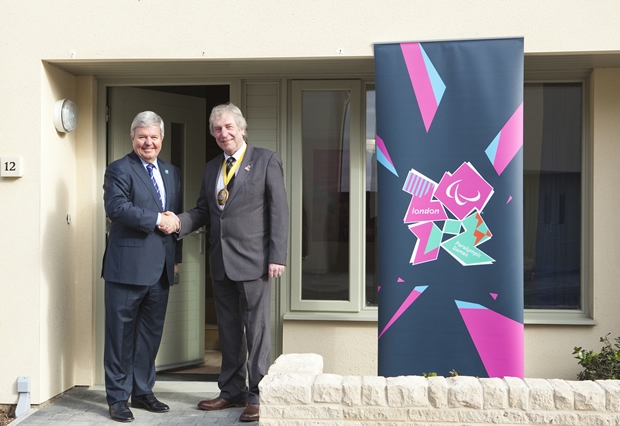LOCOG takes over Weymouth and Portland Sailing Village
Yesterday saw the London 2012 Organising Committee (LOCOG) take temporary ownership of the Weymouth and Portland Sailing Village for the summer as it gets ready to house the competitors and team officials taking part in the Olympic and Paralympic Games Sailing events.
The Osprey Quay development, containing 84 residential units, will host 700 athletes and 550 officials during the Olympic Games. Approximately half that number will use the accommodation during the Paralympic Games.
In the official ceremony where LOCOG took temporary ownership of the Village yesterday, Sir Keith Mills, Deputy Chair of LOCOG and Councillor Graham Winter, Mayor of Weymouth and Portland joined site workers and local residents at the Village to thank them for their work and to showcase how a finished apartment will look during the Games.
During the Games each house will host around eight athletes and have all facilities except a kitchen. Athletes will eat in a temporary dining hall which will be constructed on the site and have a social area in the new Chesil Cove Foundation School which LOCOG will take temporary ownership of in May.
Sir Keith Mills, said: “This is an exciting milestone with less than six months until we welcome the first athletes and Sailing officials to Weymouth and Portland. The Sailing Village will be a fantastic facility for the athletes, but just as importantly after the Games this will be a development with both affordable and low carbon housing on offer.”
Councillor Graham Winter said: “I think the athletes will enjoy the Village atmosphere of these wonderful new facilities which of course is just one element of welcoming them to Weymouth & Portland. There’s going to be so much going on in the Borough during the Games that the area will benefit from a huge influx of visitors, but it’s also great to see that there will be a lasting legacy for local people as well”
After the Sailing competitions have finished this summer the apartments will be converted into homes with 25% of the housing made available to a registered landlord for social housing needs.
All the residential units are low carbon with the heating and hot water for 58 of the homes comes from a biomass heating system and many of the houses are fitted with rainwater harvesting.











Latest Comments
Add a comment - Members log in